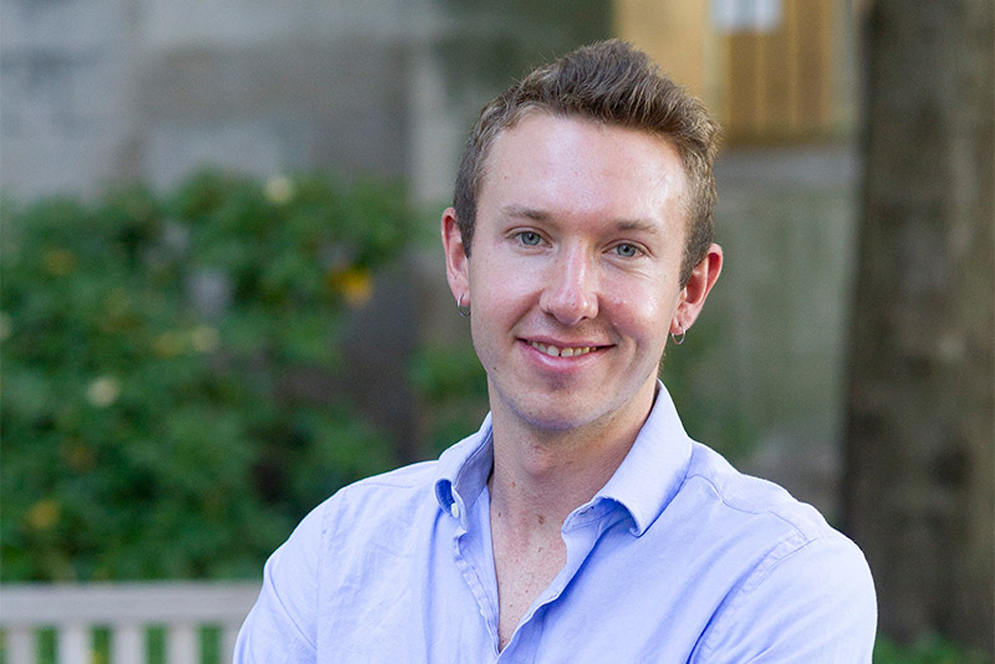James Uden draws so much meaning and inspiration from ancient texts that he has a phrase from a Roman poet inked on his arm. With a 2019 Andrew W. Mellon Foundation New Directions Fellowship, the College of Arts & Sciences associate professor of classical studies will take medical anthropology and cross-cultural courses at the School of Medicine while working on a book about the intersection of medicine and literature during the Roman Empire and Late Antiquity period (the years from 100 to 600 CE). Ultimately, he hopes to gain insight into how different societies conceptualize health and disease throughout history and during the current day. Distinguished for his teaching style, Uden believes that the study of ancient history and literature can help us unlock the power of empathy as we strive to understand other people’s life experiences in today’s politically fraught era.
Bostonia: You studied law as a University of Sydney undergraduate. What changed from there? How or why did you fall in love with classical studies and decide to pursue your PhD?
Uden: I fell in love with Latin in high school thanks to a great teacher, and I studied Latin and Japanese as an undergraduate at the University of Sydney. But nobody in my family really knew how I could make a living from reading Latin poems, least of all me. I did the law degree, and certainly don’t regret it—somehow the skills I learned must have helped me along the way. But I spent a lot of time in law school secretly reading and writing about Latin literature, and in my final year I plucked up the courage to give a paper about the exile poems of Ovid at a national professional conference for classicists. The chair of the Columbia classics department was in the audience, and he suggested I ditch the law and do a PhD in classics. I finished out my final class in law school in December 2005, and in January 2006 I started my PhD in classics at Columbia University.
If you could have dinner with one historical figure from ancient Greece or Rome, who would it be and why?
Since I was a teenager, I’ve had a tattoo of a phrase by the Roman poet Catullus on my upper arm, so I guess it would be him. But anyone who interacted with Catullus in Rome was in constant danger of showing up in one of his abusive poems, so I’d run a real risk.
This Catullus guy sounds like a real character. Did he write any scathing poems about Romans we would recognize from our history books? And what’s the phrase you tattooed on your arm?
Yes, Catullus wrote some abusive poems about Julius Caesar and his goons, as well as critiquing many of the prominent politicians and poets of his day. He was a real rock star—great artist, died young, set out to aggravate powerful people around him.
The phrase from Catullus tattooed on my arm is “Odi et amo,” which means “I hate and I love.” That’s his attempt to capture the state of agony after you’ve stopped liking someone, but unfortunately you still love them. I chose it because I liked how extreme it was. No adjectives! It cut things down to the bare essence. As a teenager, I saw it as a manifesto for doing everything to the max. Hopefully quickly.
Where does your love for teaching come from?
I think a lot of teaching is imitation and practice: you imitate the bits you liked about the people who taught you, and you constantly practice in the classroom. I see teaching as a constant process of experimentation. You can always do better. I’m still working on it.
If you had to leave your students with one big takeaway from your classes, what would it be?
History is not just about knowing what happened and when. It is a way to train a sense of empathy with people whom you will never meet. In my classes, I always try to get my students to practice their skills in imagining what life would have been like in a very different time. Students in my World of Rome class, for example, end the semester by writing diaries either in the voice of a 12-year-old Roman girl, or as a woman who has just been freed from slavery (with footnotes to ancient texts for every historical detail). People sometimes think of ancient history as impractical or unrelated to everyday life. In fact, especially in today’s political situation, the ability to see life from someone else’s perspective is pretty much the most valuable skill a young person can learn.
Kat J. McAlpine can be reached at katjmcal@bu.edu.














































Related Stories
Swapping High-Tech Studies for the Classics
CAS student’s journey from engineering to Latin
$2.5 Million Gift Creates Maria Stata Professorship
Endowment focuses on classical Greek studies
What Ancient Dinners Tell Us about Climate Change
Answers may point the way to our own survival
Post Your Comment